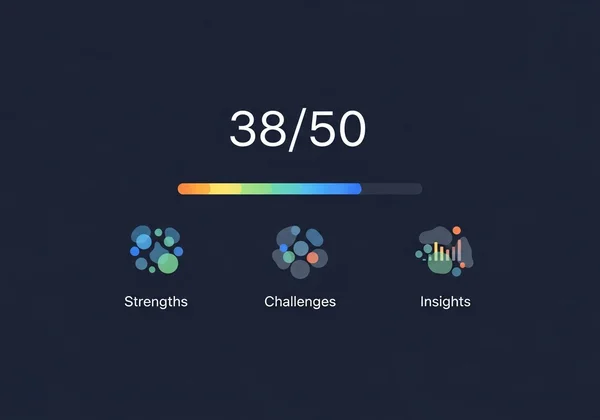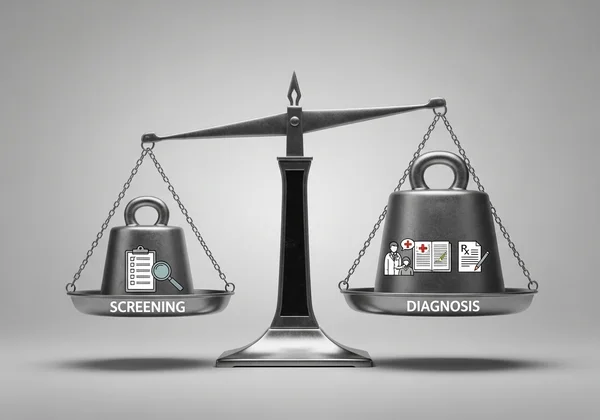AQ Test Explained: Autistic Spectrum Quotient & Scores
August 4, 2025 | By Silas Archer
Have you ever wondered if your unique way of seeing the world, your social interactions, or communication style might indicate you're on the autism spectrum? Many individuals seeking self-understanding come across the AQ Test, a widely recognized tool for exploring autistic traits. This guide will demystify the Autistic Spectrum Quotient test, helping you understand what it is, how it works, and what your results could mean for your journey of self-discovery.
The AQ Test is a valuable starting point, a way to put language to experiences you may have felt your entire life. It’s a tool for reflection, not a label. If you're ready to take a structured first step in this exploration, you can try our free tool and gain insights into your personal traits. This scientifically-informed questionnaire offers a glimpse into the patterns that make you who you are.

What is the Autistic Spectrum Quotient (AQ Test Online)?
The Autistic Spectrum Quotient, commonly known as the AQ Test, is a self-administered questionnaire designed to measure the extent of autistic traits in an individual. It's one of the most widely used screening tools for adults and adolescents, providing a numerical score that indicates where someone might fall on a continuum from neurotypical to autistic. It serves as an initial step for those seeking to understand their own cognitive and behavioral patterns.
This test is not about diagnosing a disorder but about identifying characteristics. It helps people, from self-doubting adults to curious students, make sense of their experiences with social skills, communication, and focus. Many find that taking an online autistic test based on the AQ framework is an empowering first move toward self-acceptance and clarity.
The Origins and Development of the AQ Test
To trust a tool, it helps to know where it comes from. The development of the AQ Test is rooted in scientific research. It was created in 2001 by Professor Simon Baron-Cohen and his colleagues at the Autism Research Centre at the University of Cambridge. Their goal was to create a brief, easy-to-use measure that could quantify autistic traits for research and preliminary screening purposes.
The test was developed by identifying characteristics that are more common in autistic individuals compared to the general population. Its foundation in academic research gives it credibility as a screening instrument. This scientific backing is why platforms like ours use the AQ framework as the basis for their initial assessment, providing a reliable start to your journey of self-discovery.

What Autistic Traits Does the AQ Test Measure?
The AQ Test doesn't just ask random questions; it is specifically structured to assess traits across five key domains related to autism. Understanding these areas can itself be illuminating. When you take an autistic traits test, you are exploring:
- Social Skill: Questions in this area assess your comfort and proficiency in social situations. This includes understanding social cues, navigating small talk, and feeling at ease in group settings.
- Attention Switching: This domain looks at how easily you can switch your focus from one task or topic to another. Difficulty with this can be a common autistic trait.
- Attention to Detail: This measures a strong focus on details, patterns, and precision, sometimes at the expense of seeing the bigger picture. This is often recognized as an autistic strength.
- Communication: This section explores pragmatic aspects of communication, such as interpreting figurative language, understanding subtext, and knowing what to say in conversations.
- Imagination: This domain assesses imagination in a specific way, often related to social imagination—the ability to easily imagine oneself in another's shoes or create fictional narratives.
Understanding Your AQ Test Score Interpretation
After completing the 50 questions of the AQ Test, you receive a score. This is where many people's biggest questions lie. It's crucial to approach your AQ Test score interpretation with the right mindset: it is an indicator, not a verdict. The score provides a piece of data in your larger personal puzzle.
The score is a quantitative measure of the traits you reported. On our platform, we provide this score as a baseline, but we also offer something more. For those who want to go deeper, our platform uses AI to generate a personalized report, transforming a simple number into actionable insights about your strengths, challenges, and life experiences.
Interpreting Your AQ Score: What the Numbers Indicate
The AQ Test is scored on a scale of 0 to 50. While there is no universal "magic number," the original research by Baron-Cohen suggested a threshold. Generally, scores are interpreted as follows:
- Low to Average Score (Below 32): A score in this range suggests fewer autistic traits. Most neurotypical individuals score below this threshold.
- High Score (32 and above): A score of 32 or higher indicates a significant number of autistic traits. The original study found that approximately 80% of autistic individuals scored in this range, compared to a very small percentage of the control group.
A high vs low AQ score simply reflects the quantity of reported traits. It's a starting point for reflection. Does this number resonate with your lived experience? Exploring this question is the next important step, and a detailed AI analysis can help you connect the dots.

AQ Test Limitations: It's a Screening, Not a Diagnosis
This is the most critical point to understand. An autistic spectrum disorder test taken online is a screening tool. A high score does not mean you are autistic, and a low score does not definitively mean you are not. It is an indication that you may want to explore further.
A screening tool identifies the potential presence of certain characteristics. A clinical diagnosis, however, is a comprehensive evaluation conducted by a qualified healthcare professional, such as a psychologist or psychiatrist. This process involves detailed interviews, behavioral observations, and a review of your developmental history. The AQ Test is a fantastic first step, but it cannot and should not replace a professional evaluation.

Beyond the Score: Next Steps After Your Autistic Test
Receiving your score can bring up a mix of emotions—relief, confusion, validation, or curiosity. Regardless of the outcome, the journey doesn’t end with the number. The real value of an autistic test for adults is what you do with the information. It’s about using this new insight to empower yourself.
Considering a Professional Autism Diagnosis
If you scored high on the AQ test and the results deeply resonate with you, you might consider seeking a professional autism diagnosis. A formal assessment can provide definitive clarity, open doors to workplace accommodations, and offer a framework for understanding yourself more deeply. The autism assessment process is thorough and designed to give you a complete picture. This path isn't for everyone, but for many, it's a validating and helpful step.
Embracing Neurodiversity and Self-Discovery
Whether or not you pursue a formal diagnosis, you can use your results as a launchpad for self-discovery. The concept of neurodiversity suggests that variations in the human brain are natural and that different ways of thinking and experiencing the world should be respected.
Understanding your traits allows you to develop personalized strategies for navigating challenges and leaning into your strengths. Perhaps you realize you need more quiet time to decompress after social events or that your intense focus on details is a superpower in your work. This is the essence of making exploration easier and life richer.
Empowering Your Journey: Next Steps with Our Autistic Test
The Autistic Spectrum Quotient (AQ) Test is a powerful, scientifically-grounded tool for anyone beginning their journey of self-exploration. It provides a structured way to measure autistic traits and offers a concrete starting point for understanding your unique cognitive profile. Remember, it is a guide, not a final destination.
Your score is just the beginning. We believe in empowering you with deeper knowledge. We invite you to move beyond a simple number and discover the "why" behind your traits. Take our free autistic test today to receive not only your score but also the option for a comprehensive, AI-powered report that provides personalized insights, strategies, and affirmations for your path forward.
Frequently Asked Questions About the AQ Test
Is the online autistic test accurate?
Online tests based on the AQ framework, like the one on our site, are accurate screening tools. They reliably measure the autistic traits they were designed to assess. However, they are not diagnostic tools and cannot replace a comprehensive evaluation by a qualified professional.
What to do after a high score on an autism test?
A high score is a prompt for reflection. Consider how the results align with your life experiences. You can use it as a catalyst for learning more about neurodiversity, developing self-accommodation strategies, or seeking a professional opinion. Our free autistic test online provides a detailed AI report that can help guide your next steps with personalized insights.
How do I know if I'm autistic?
The only definitive way to know is through a formal diagnosis from a healthcare professional. However, taking a scientifically-informed autistic test like the AQ is an excellent and accessible first step. It can provide strong indications and help you decide if pursuing a formal diagnosis is right for you.
Can you be slightly autistic?
Autism is a spectrum, meaning traits manifest with varying intensity. The term "slightly autistic" is not a clinical one, but it captures the experience of many people who have some autistic traits but may not meet the full criteria for a diagnosis. The AQ test can help you understand where you might fall on this broad continuum of human experience.